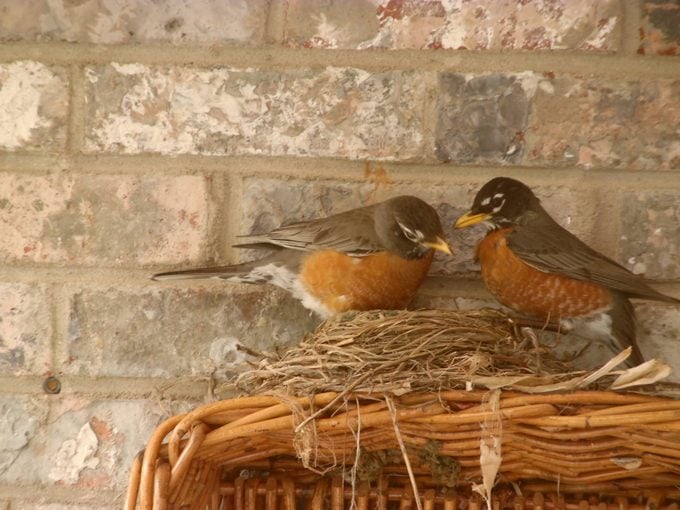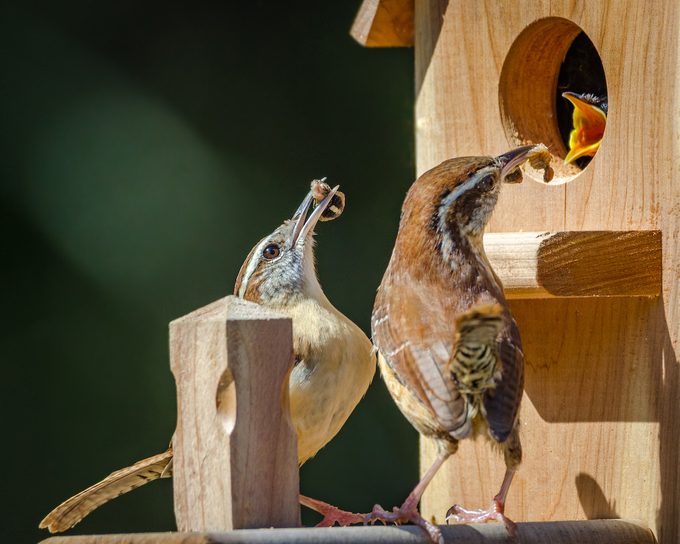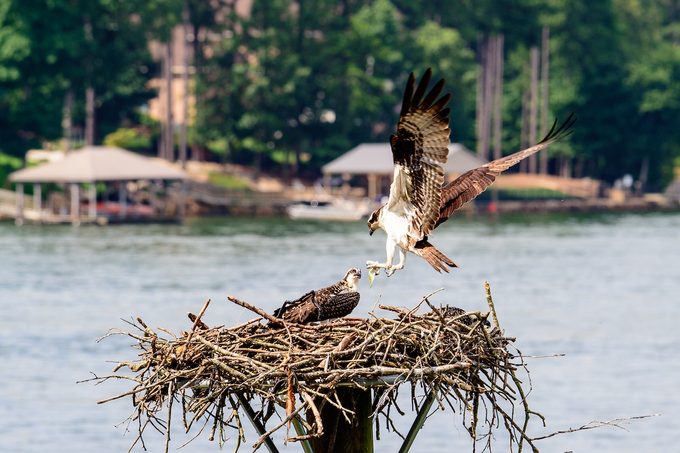Name of Action Baby Birds Do to Beg for Food
Celebrate the hardest-working feathered fathers out at that place! These great bird dads don't wing away when the chicks hatch.

It's Male parent's Day, but the bird dads in our backyard aren't kicking back and enjoying the warm summer day. A male person vocal sparrow, flecked with brown and white, lands on a tree co-operative to sing between trips to a hidden nest where his hungry offspring wait for the next mouthful. Meanwhile, a flash of scarlet on the opposite side of the hedge means a male northern key is delivering dinner to his own eager brood.
Dads of some species of the bird world provide more than just meals, though. They help build nests, incubate eggs and stick around even later the moms accept left. (To give credit where credit is due, there's no denying that female birds frequently wind up with more than their fair shade of parenting duties. For example, male hummingbirds may be flashy, but they're not very helpful. They don't even stick around to scout the females raise their immature.)
Every bit a salute to the feathers with feathers that exercise assistance out effectually the nest, allow'southward turn the spotlight on these hardworking parents.
Lending a Fly

A number of backyard bird dads, including cardinals and Baltimore orioles, spring into activity one time their babies are hatched, flight back and forth with nutrient. Even after the youngsters accept left the nest, bird dads feed them for several days to make sure they have the best chance of survival. And if the female starts working on a 2nd nest earlier the previous brood is completely independent, the male may become super dad and take on caring for the fledglings entirely on his own.
Many males are busy parents fifty-fifty before the eggs hatch. For case, a male American robin brings his female partner bits of textile as she constructs the nest. At dawn, he constantly sings from a high perch. It may be a little annoying for his man neighbors, but he's doing the important chore of protecting his territory. Without his vigilant efforts, other robins might invade and consume all the juicy bugs and worms, making information technology harder for the robin parents-to-be to find plenty nutrient for their future nestlings.
Equal Partner Parenting

For some birds, like featherlike woodpeckers, parenting is a true partnership. Male and female downies work together to carve a nest hole in a dead tree torso or limb, taking turns chiseling away to create a safe, secure cavity. They both incubated the eggs, also. Mom and Dad take turns during the twenty-four hours, simply at dark information technology'south usually Dad who takes over. And one time the babies have hatched, both parents help feed them. Sometimes the male featherlike woodpecker will end up feeding the young more than the female person does.
Birds of prey, like hawks and owls, take a similarly balanced parenting style, although males and females take on different roles. Both red-shouldered hawk parents build the nest, for example, only only the female does the incubating and watches over the immature in one case the eggs hatch. The male isn't slacking off, though. Information technology'south hist job to keep the nutrient supply coming, first for the female every bit she sits on the egg, and then for the whole ravenous family.
Role Reversal

Some female birds don't settle for sitting on nests all day. Phalaropes (three species of minor sandpipers) are a prime case of this parenting flip-flop. The females are more than colorful than males and take the pb in courtship, and one female may have more than one mate. But whether she has one mate or several, she lays a clutch of four eggs for each of them, and leaves new dads to incubate eggs and heighten young.
Spotted sandpipers, common in ponds and streams in virtually of North America, have a similar parenting technique, merely for a long time scientists didn't realize it because the males and females look nigh identical. These days, we know that spotted sandpiper dads practice most of the incubating and disposed to the immature. The moms are too busy laying clutches of eggs with other dads to help out!
Whether they're endlessly hunting down nutrient or shouldering all of the raising and rearing themselves, bird dads are pretty astonishing. From potent nests to healthy fledglings, bird dads make it all possible.
Bird Dad Awards
Birds that become beyond the phone call of daddy.
Best Builder:The male person business firm wren is serious nigh nest-building, because it'due south what helps him attract a mate. He starts constructing a few nests at one time, and his female partner chooses the most promising i and finishes information technology.
Best Incubator:Northern flicker fathers practice the heavy lifting when it comes to keeping the eggs warm. Their incubating duties leave them sitting on eggs all dark long and half the day also.
Best Provider:While a snowy owl mom is decorated with the nestlings, the dad brings nutrient to go on everybody fed. If information technology's been a especially good year, he may go out a large stockpile of expressionless lemmings and other rodents around the nest.
Best Accommodating Parent:Non simply do male person sandhill cranes help with nest-edifice, incubation, and feeding their immature, but families stick together through fall migration, winter and the showtime of jump migration. Immature cranes learn and benefit from both parents.
swansonsumpeormses.blogspot.com
Source: https://www.birdsandblooms.com/birding/birding-basics/meet-the-best-bird-dads-around/
Post a Comment for "Name of Action Baby Birds Do to Beg for Food"